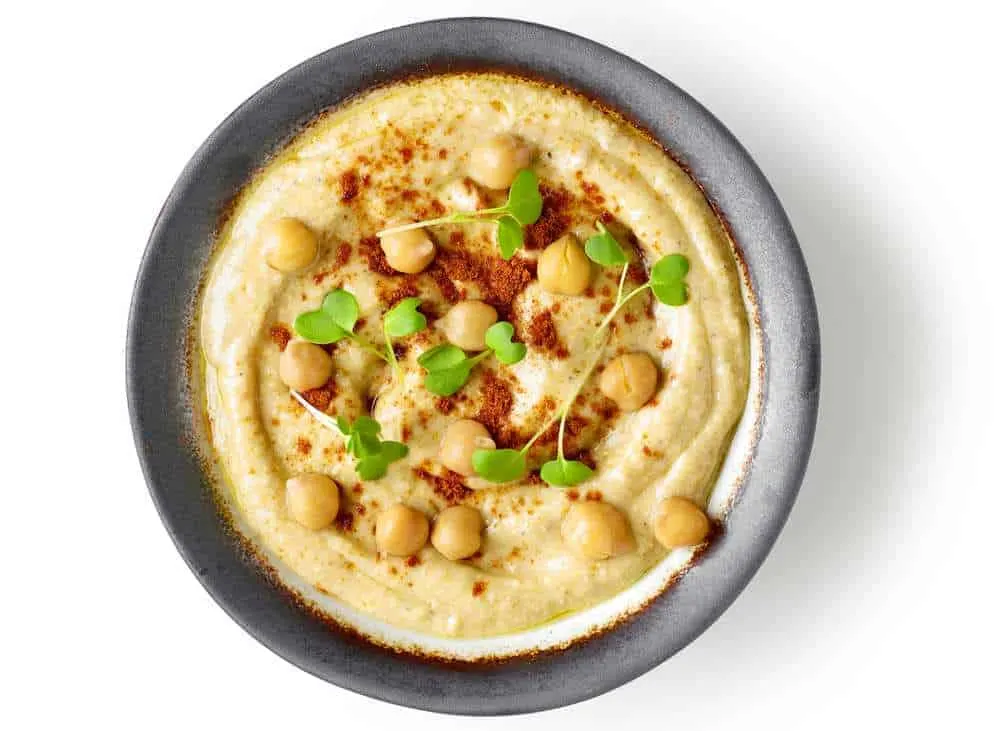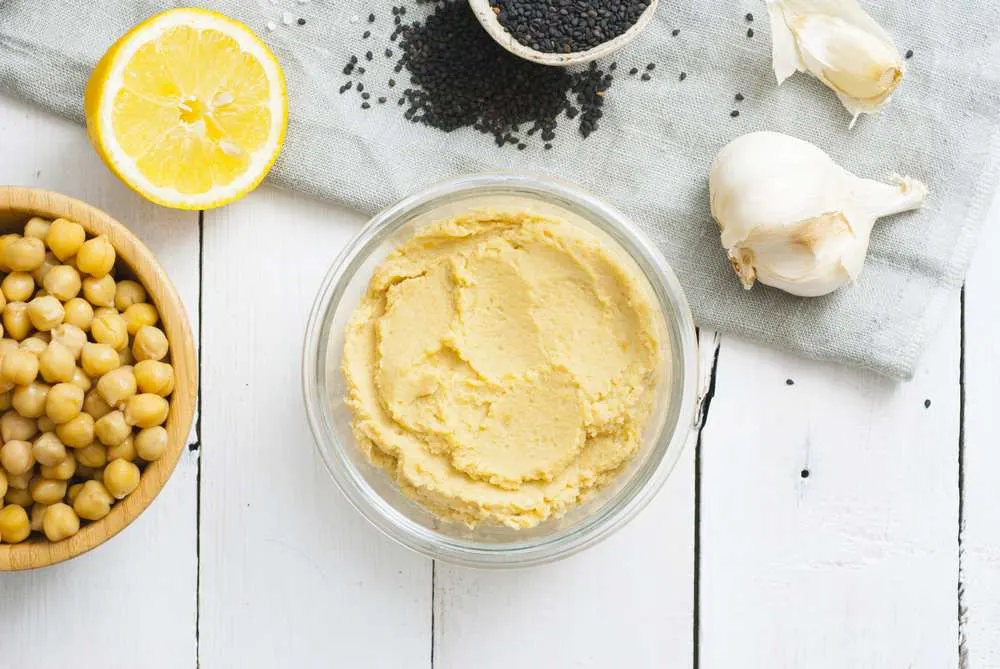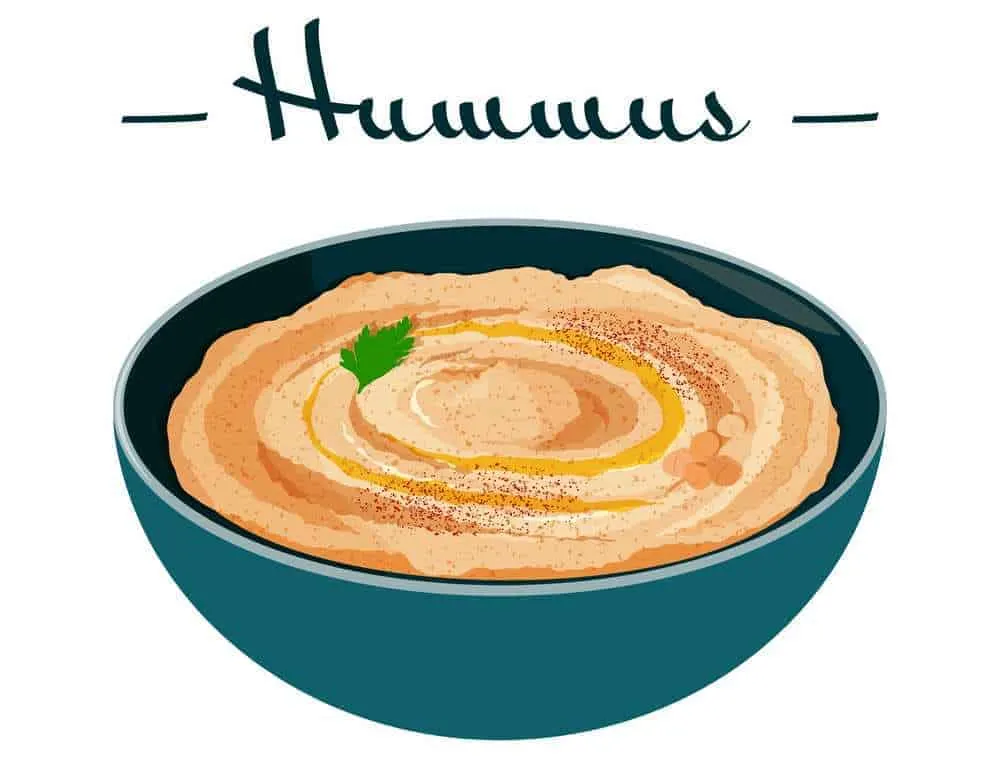One evening you’re watching your favorite show and craving some hummus. You start to dip your favorite chips in it, and your dog is blocking the TV. He wants the piece of the action. As a dog owner, you already probably know the feeling. It’s hard to imagine a situation when your dog isn’t all in your face or between your legs when there’s food involved.
Hummus is a prevalent Middle Eastern food. Some people use hummus as a spread, while some use it as a dip. Either way, hummus is indeed a superfood for humans! With its many impressive nutritional and health benefits, this chickpea spread can do wonders for our bodies and minds. But, that brings up the question – can dogs eat hummus?
Giving human food to dogs can sometimes be tricky. Dogs, by their nature, tend to get over-excited about any food that’s in their sight. Unfortunately, not all human foods are canine-friendly, so it’s crucial to be well informed before sharing some with your pup.
In this article, we’re going through all the necessary information that involves hummus consumption in dogs. Can dogs eat hummus? And if they can, can hummus cause some health issues to your dog? If these questions are bothering you, you’re in the right place!

Can Dogs Eat Hummus?
The answer to your burning question is: Maybe.
It’s mainly a no, but with a few exceptions. For better understanding, we should start by looking at the nutritional value and ingredients of hummus.
Traditional hummus is typically made of four ingredients: chickpeas, tahini, garlic, and lemon juice. While the first half of these ingredients have massive health benefits, the other two are not considered suitable for dog consumption.
Nutritional Value
Before we dive deeper into explaining the pros and cons of all the ingredients, here you can see the nutritional value of a 100 gram serving of hummus:
| Calories | 166 |
| Fat | 9.6 grams |
| Protein | 7.9 grams |
| Carbs | 14.3 grams |
| Fiber | 6 grams |
| Vitamin B6 | 10 % of the RDI |
| Potassium | 7 % of the RDI |
| Folate | 21 % of the RDI |
As you can see, hummus has nutritional value that can make other food “feel bad.” Most of these virtues come from tahini and chickpeas, but garlic and lemon juice assist them very well.
How Hummus Ingredients Affect Your Dog
Chickpeas
The “Garbanzo beans,” as some like to call them, have been grown for a thousand years. They have Mediterranean and Middle Eastern roots, and without chickpeas, you don’t have hummus. The main ingredient in hummus is a part of the legume family.
Chickpeas have many benefits for humans, and they can be very healthy for our four-legged friends. Besides being low in calories, they are rich in protein, fiber, vitamins, and minerals. With all that in mind, chickpeas yield numerous health benefits and are completely safe for dogs to eat.
Tahini
Sesame paste, better known as tahini, is also entirely safe for dogs to eat. Tahini is an extremely healthy ingredient that’s used in a variety of meals worldwide. Sesame paste is made out of roasted sesame seeds that are grounded into a paste.
Tahini can even serve as a healthy alternative to peanut butter. This thick paste is filled with healthy fatty acids, proteins, and vitamin B1. However, too many healthy foods are not good, either. Tahini is quite caloric, with 190 calories in only two tablespoons! In conclusion, tahini is also a dog-friendly ingredient.
Garlic
Garlic is the number one reason why hummus is a forbidden treat for dogs. Unfortunately, even though garlic is an excellent addition to almost every human meal, it can be harmful to dogs.
Garlic, just like all the members of the allium family, contains thiosulfate. This substance is very toxic to dogs. Thiosulfate can lead to oxidative damage to red blood cells, resulting in anemia in extreme cases.
On the contrary, some studies have revealed that a dog needs to eat much more garlic to get sick. Still, some dogs are more sensitive to thiosulfate than others. That’s why it’s not worth the risk.
Lemon Juice
This great source of vitamin C can, unfortunately, harm your dog’s well-being. The aromatic oils and psoralen compounds can be toxic to our furry friends. Also, the acidity can lead to an upset stomach. On the bright side – canines hate lemons. So there’s a small chance that your dog ends up in that situation.

Dog-Friendly Hummus
Is there a way that a dog can still enjoy hummus and stay healthy? Of course, there is. Although the traditional recipe and most store-bought versions contain garlic and lemon juice, you can even make or find dog-friendly hummus. Hummus is still just blended up chickpeas. The only condition for dog-friendly hummus is to skip on the two harmful ingredients.
There are many non-garlic and non-lemon store-bought hummus, but you can easily make one by yourself. With the store-bought hummus, you need to watch out for the salt and seasoning content – too much of that can harm your pup.
Homemade Dog Hummus
As mentioned before, homemade dog-friendly hummus is relatively easy to make. All you need is a blender, cooked chickpeas, and you can add some carrots to make it extra tasty. The only tip you need here is to cook the chickpeas two times before blending them. That way, you can prevent possible bloating or excessive gas. If you’re using canned chickpeas – you’re good to go.
This type of hummus is not only safe for your dog, but it’s ultra-healthy. Homemade hummus can be a great healthy treat and a protein boost, but only when consumed in moderation, just like any treat.
How Much Dog-Friendly Hummus Can You Give Your Dog?
So, you’ve made or bought dog-friendly hummus, and you’re wondering – how much is too much? The answer that you’re looking for is actually simple. Don’t give your pup more hummus than the recommended amount of treats in his diet. That is no more hummus than 10% of his regular diet.
Unfortunately, it’s not recommended to give your pup chickpea food every day and in large quantities. Chickpeas are high in dietary fiber, causing stomach problems and even diarrhea when fed in excessive amounts. Furthermore, you should slowly introduce chickpea products into your dog’s diet. Start with small dosages, and if your dog is handling it well, gradually increase the dosage.
| Large breeds | Three tablespoons of dog-friendly hummus once or twice a week. |
| Medium-sized breeds | Two tablespoons of dog-friendly hummus once or twice a week. |
| Small breeds | One tablespoon of dog-friendly hummus once or twice a week. |

Health Benefits Of Hummus For Dogs
Plain hummus consumed in moderation with no garlic, lemon, or seasonings can do wonders for your dog’s well-being. Some of the health benefits are:
- Better digestion – As mentioned before, chickpeas are filled with dietary fibers. When consumed in moderation, it can resolve gastrointestinal and digestive issues. That’s why they’re useful when fighting constipation in dogs.
- Reduces high blood pressure – Because of the high potassium levels, chickpeas provide a healthy heart. Potassium reduces high blood pressure and dilates blood vessels.
- Immunity boost – With numerous vitamins in chickpeas and tahini, dog-friendly hummus is, without a doubt, a great immunity booster.
- Shiny fur – Zink in the main ingredient of hummus provides shiny fur and healthy skin.
- Weight loss – If your dog needs to go on a diet, dog-friendly hummus is an excellent option for a treat. Chickpeas are low in fat and calories but also full of fiber.

Health Risks Of Hummus For Dogs
Most of the health risks come from garlic and lemon juice in hummus, which we mentioned before. Although a small amount will probably not harm your dog, it’s good to know why you should avoid it. Besides that, how your dog reacts to hummus depends on his size and sensibility to particular foods.
The most toxic ingredient is garlic because of thiosulfate, which can, in most cases, lead to stomach upset or, in extreme cases, anemia. Anemia can lead to organ failure, internal organ damage, and even a fatal outcome.
If you by any chance suspect that your dog has anemia, symptoms include:
- Pale gums
- Lethargy
- Weakness
- Increased heart rate
If your dog has ingested garlic and has any worrying symptoms, call your veterinarian.
There is also a health risk with dog-friendly hummus, which can come from overconsumption. Giving your dog too many chickpea-based foods can lead to cramps and even bloat. Bloat should not be confused with excess gas because it’s a much more serious condition. Bloat can lead to stomach convulsion, which requires emergency medical treatment.

Final Words
Even though it’s always fun to share a treat with your beloved dog, it’s not usually a good idea. Before you give your dog human food, always be informed about the potential health risks that can cause.
With all that said, regular hummus is unfortunately not good for your pup. However, if you take some time to make it yourself, it can be tasty and beneficial! So don’t be lazy and mix up some chickpeas; just skip on the toxic ingredients!
Learn More: What Can Dogs Eat? A Comprehensive List Of Dog-safe Foods

